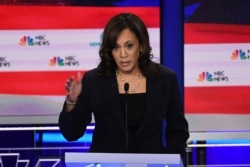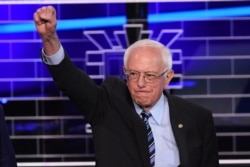Women of color may be better positioned than most groups of voters in the country to hand President Donald Trump a loss in the 2020 presidential election, experts say.
One out of every four voters in Florida, Texas, Arizona and Georgia — states with significant shares of electoral votes — is a woman of color. In the 2018 congressional midterm elections, black females helped drive the so-called "blue wave" of Democratic votes, flipping the U.S. House of Representatives away from Republican control. Their showing of 55 percent of eligible voters outpaced the national turnout rate by 6 percentage points.
But as a diverse group of women gathered this week in Miami to watch the Democratic debates and mark the official kickoff of election season, another number could not be ignored. In 2016, Democratic presidential candidate Hillary Clinton lost Florida — and its critical 29 electoral votes — to Trump by just 112,000 popular votes. Black voter turnout in Florida dropped more than 3 percentage points in 2016 from the previous presidential election in 2012, part of an overall nationwide decline in voter turnout among African-Americans and Latinos in that election.
Florida key
Grass-roots activists in Florida are vowing that will not happen again in 2020.
"No one will win the nomination without the enthusiastic support of women of color — and no one will win the presidency without winning Florida," Amie Allison, founder and president of She the People, a national network elevating the political power of women of color, told voters at a debate watch party Wednesday night.
The Democratic Party sent a clear message that outreach to minority voters would be a priority this election cycle by scheduling the first candidate debates in diverse Miami, a city known for its strong connections to immigrant communities hailing from Haiti, Cuba and around the world.
Minority women's vote
But as the women gathering to watch the debate emphasized, their vote is by no means a given for the eventual Democratic nominee. And they want assurances that their concerns are taken into account by the Democratic Party.
"Everybody wants that Latino vote. They know it's critical so they are here to talk to us," said Frances Colon, an organizer with Ruth's List, an organization that helps progressive women run for office. "It's not enough to want Trump out of office — you need to tell us what you're bringing to the table, what you're going to offer us in exchange for our vote."
Among the major concerns of women of color: climate change, health care, income inequality, housing and education.
Colon — who is originally from Puerto Rico — said she is still considering all of the candidates but is glad to see Kamala Harris, a woman of color, in the race.
Harris' breakout moment
Harris had a breakout moment in the second night of the debates Thursday when she confronted former Vice President Joe Biden, the front-runner in the Democratic field, about his past cooperation with segregationists in the U.S. Senate and his opposition to busing to desegregate public schools.
"There was a little girl in California who was part of the second class to integrate her public schools," Harris told Biden during the debate. "And she was bused to school every day. And that little girl was me."
Harris and Rep. Tulsi Gabbard of Hawaii are the only women of color in the Democratic field of candidates. Harris' presence resonates with many voters and could help drive turnout if she manages to overtake Biden, Vermont Sen. Bernie Sanders and other leading candidates.
"It's important that we see ourselves and our communities reflected in this race for president, especially when the usurper of the White House has so many policies and rhetoric that challenges and harms our communities," said Andrea Mercado, the executive director of The New Florida Majority, an organization that mobilizes Florida voters.
Florida ballot initiative
The New Florida Majority was one of many organizations that helped pass Amendment 4, Florida's ballot initiative restoring voting rights for 1.5 million felons. Mercado said the enthusiasm generated by that effort will spill over into the 2020 presidential election.
"If that didn't show the power of the vote and the power of mobilizing our community, I don't know what does. But we certainly have work in front of us to register voters, to educate voters and in particular in communities of color and young people," she said.
Michelle Sanchez, a Latinx organizer with the New Georgia Majority, is aware of the challenges of persuading younger voters to participate in the political process. After voting for Barack Obama in her first presidential election in 2008, she became disillusioned with his failure to enact immigration reform.
"I didn't think I was ever going to vote again because I promised myself I wasn't going to vote for the lesser of two evils," Sanchez said. "Then along came Bernie Sanders and I looked him up and he has run on the same issues. He has not wavered his entire career."
Climate change
Sanchez said that even if Sanders does go on to win the presidency, it may too late for him to enact legislation that reverses the impact of climate change.
Mercado said that while Florida is "ground zero" for climate issues, women of color were also waiting to hear from the candidates on "wages and the rising cost of housing and income inequality. Issues of health care, the cost of education — what families have to worry about. Not only how to pay for their children's schooling but what kind of jobs they're going to get when they get out of school."
Candidates reach out
Candidates are beginning to make a concerted effort to reach out to communities of color through concrete policy proposals. In the key early primary state of South Carolina, where black voters make up 60% of the electorate, Massachusetts Senator Elizabeth Warren, former Congressman Beto O'Rourke of Texas, New Jersey Senator Cory Booker and South Bend, Indiana, Mayor Pete Buttigieg participated in a Black Economic Alliance forum. The event provided an opportunity for the candidates to lay out plans that would specifically address job growth and economic opportunity for minority communities.
Candidates are also increasingly singling out the policy impact on communities of color in town halls and campaign appearances. In the first night of the debates Wednesday, Warren answered a question about whether or not the economy was working for everyone by saying, "It's doing great for people who want to invest in private prisons, just not for the African Americans and the Latinx whose families are torn apart, whose lives are destroyed, and communities are ruined."
Candidates speaking Spanish
Warren's comment drew appreciative cheers from the debate watch-party crowd. But the reaction to candidates O'Rourke and Booker speaking in Spanish resulted in a less welcome reception.
The sense among these dedicated activists and organizers is that the 2020 election is too important for superficial outreach.
"After the 2016 election, we really woke up and realized that we need to claim our narrative," said Krystina Francois, a first-generation Haitian-American. "We need to make sure that all the candidates know that they won't be able to win without it."
2016 was the first presidential election Francois voted in, and she remembers all too well anxiously watching the long lines while wondering if people of color would come out to vote and if their votes would be counted.
Voter lethargy
Getting low-turnout African-Americans and Latinos to the polls is a challenge, and Francois says there are very good reasons for their reluctance.
"When you feel like your vote is not going to matter anyway, why make the effort after work or picking up your kids to go stand in line to vote? I think that's something that we still need to work on to make sure people understand their vote does count and we know that by the margins that we see it every election — especially in Florida — that every bit matters."









